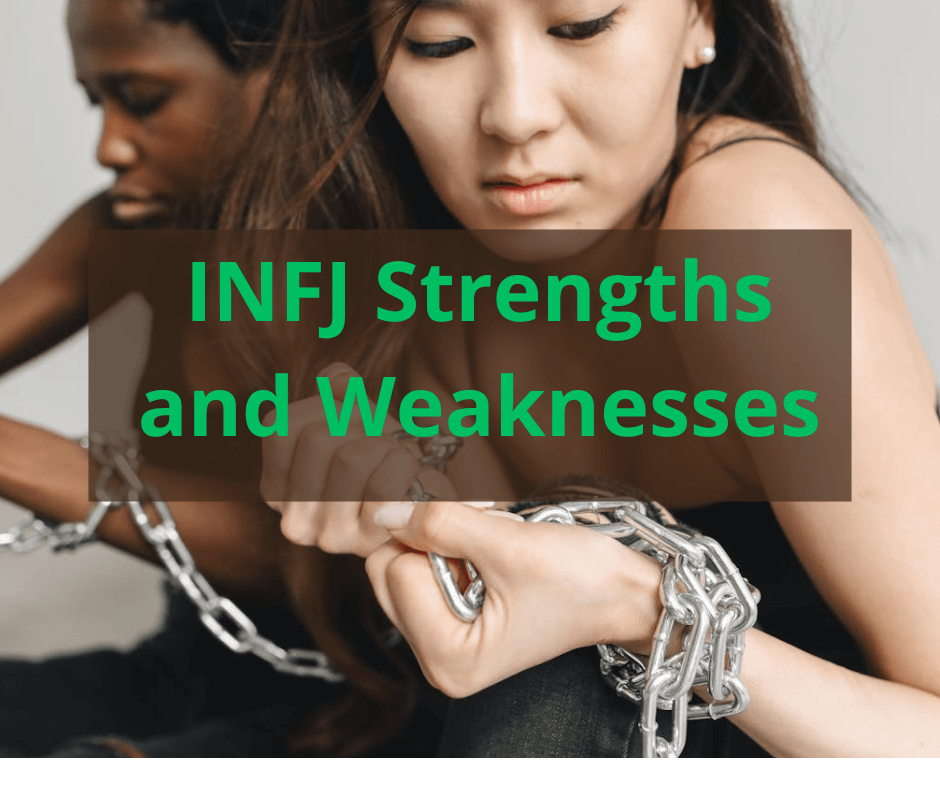INFJs are known as the “Advocate” personality type in the Myers-Briggs system. They’re rare, creative, and deeply empathetic. But like everyone, INFJs have both strengths and weaknesses.
In this article, we’ll explore the true nature of INFJs—including their greatest gifts, biggest struggles, and how they can grow. Whether you’re INFJ-A or INFJ-T, this guide will help you better understand yourself or someone you know.
What Does INFJ Mean?
What You Will Learn
INFJ stands for Introverted, Intuitive, Feeling, and Judging. It’s one of the 16 personality types in the MBTI (Myers-Briggs Type Indicator) system.
People with this personality are often:
- Quiet and thoughtful
- Focused on deep meaning and purpose
- Emotionally in tune with others
- Driven to make a difference
The INFJ is also called the Advocate personality type because of their strong desire to help others and create a better world.

Key Strengths of INFJ Personalities
INFJs are known for their rare combination of insight and empathy. Below are their core strengths:
1. Deep Empathy
INFJs care deeply about how others feel. They can sense emotions even when people don’t speak them aloud. This makes them great listeners, counselors, or friends.
2. Creative Problem Solvers
When faced with challenges, INFJs think outside the box. They use their intuition to find new ways to solve problems—especially in people-focused areas like education, health, or social work.
3. Passionate About Purpose
INFJs don’t just want any job or life—they want meaning. When they believe in something, they give it their all. They often work hard behind the scenes to support a cause they love.

4. Strong Moral Compass
Doing the right thing matters deeply to INFJs. They’re guided by personal values and often stand up for what they believe in—even if it’s hard.
5. Excellent Communicators (in Writing)
While INFJs may be quiet in groups, they often shine in writing. Many are gifted authors, bloggers, poets, or journaling pros. Writing helps them express what they feel.

Common Weaknesses of INFJs
Even though INFJs have many strengths, they also face some real struggles. Here are the most common INFJ weaknesses:
1. Overthinking and Perfectionism
INFJs often hold themselves to high standards. They may overthink small decisions and worry about getting things “just right,” which can lead to stress or burnout.
2. Fear of Conflict
Because they care so much, INFJs often avoid conflict. They may bottle up their feelings or struggle to say “no”—even when needed.
3. People-Pleasing
Helping others brings INFJs joy—but it can go too far. They sometimes say “yes” too much and neglect their own needs in the process.

4. Emotional Burnout
Since INFJs are highly sensitive to emotions, they can absorb others’ pain. Without regular self-care, this emotional load can become overwhelming.
5. Struggles with Opening Up
Ironically, even though INFJs understand others well, they can find it hard to open up themselves. They may keep their own problems hidden, fearing they’ll be misunderstood.

INFJ-A vs INFJ-T: What’s the Difference?
INFJs can be classified into two subtypes: INFJ-A (Assertive) and INFJ-T (Turbulent). Let’s compare the two:
| Trait | INFJ-A (Assertive) | INFJ-T (Turbulent) |
|---|---|---|
| Confidence | More self-assured | More self-critical |
| Stress Response | Handles stress calmly | Feels anxious under pressure |
| Decision-Making | Trusts instincts | Doubts and re-checks decisions |
| Growth Focus | Accepts imperfections | Always striving to improve |
To make it even easier for you, I have created this fast and free quiz that will tell you which type you are Check it here 👇
Both types share the same core values but express them differently. INFJ-Ts may need more reassurance, while INFJ-As may appear calmer on the surface.

INFJ Traits That Stand Out
Here are some standout traits that define INFJs:
- Intuitive: They sense future possibilities and hidden meanings.
- Introverted: They recharge alone but care deeply for others.
- Idealistic: They dream big and often want to change the world.
- Organized: They like structure and long-term planning.
- Private: They keep their true thoughts and feelings to a trusted few.
These traits help INFJs build deep relationships and work on long-term goals—though they may struggle in chaotic or surface-level environments.

INFJ Flaws That Often Go Unnoticed
INFJ flaws are not always obvious. Some of the deeper challenges they face include:
- Suppressing their needs to avoid rocking the boat
- Taking on emotional burdens from others
- Getting discouraged if their efforts don’t have visible impact
- Withdrawing when overwhelmed, leading to isolation
These weaknesses don’t make INFJs bad people—just human. The key is learning how to manage these traits instead of fighting them.

Growth Tips for INFJs
Here’s how INFJs can grow stronger and more balanced:
✔ Set Clear Boundaries
Say “no” when needed. You can’t help others if you’re drained. Boundaries protect your energy.
✔ Practice Self-Compassion
Perfection isn’t required. Learn to speak kindly to yourself—especially in moments of doubt.
✔ Share Your Inner World
Let trusted friends in. Talking about your fears and needs helps build stronger connections.
✔ Schedule Alone Time
Don’t feel guilty for needing space. Solitude is part of how you recharge and stay centered.
✔ Take Action on Ideas
INFJs can stay stuck in planning. Push yourself to act—your vision matters and deserves to be real.

INFJs at Work and in Relationships
In the workplace, INFJs do best in roles that allow creativity, purpose, and one-on-one connection. Great INFJ careers include:
- Counselor
- Writer
- Teacher
- Social Worker
- Psychologist
- Coach
In relationships, INFJs are loyal, thoughtful, and deeply committed. They crave emotional depth and honest communication. However, they may struggle with:
- Expressing anger directly
- Needing lots of space to process
- Becoming overly idealistic about love
The right partner respects their quiet depth and supports their emotional world.

Final Thoughts: Embrace the INFJ Within
INFJs are deep, thoughtful souls who care deeply about the world. If you’re an INFJ, your strengths are powerful—but so are your struggles. By understanding both, you can build a life that honors your nature.
Whether you’re INFJ-A or INFJ-T, remember: your voice matters. Your dreams matter. And your quiet power can make a loud impact.




